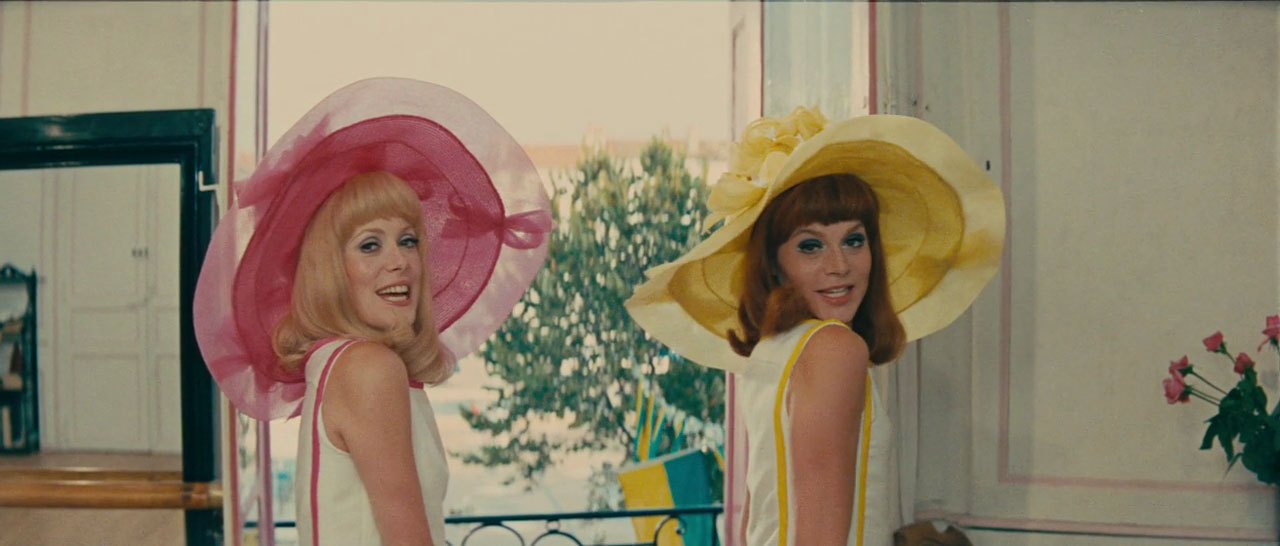Sept. 2016:
Watched this again in the beautiful blu-ray restoration, along with Agnes Varda’s documentary. Of course, I take back the comment below that the music is unmemorable – I find no showtunes memorable until I’ve heard them a second time, and now I feel like I’ve known the twins’ theme song forever. Had completely forgotten that there’s a murder in this movie, a family friend who hangs around the café is arrested for chopping up a girl named Lola-Lola (Blue Angel reference?). Re: the English version of The Young Girls, it’s glimpsed in the Varda doc, but apparently nobody thought it worth restoring and adding to this box set, so that’s probably the final word on that.

Transporter Bridge, transport me away:

Oct. 2007:
Not a total musical like Umbrellas was, and no connecting characters between the two, just a brief mention of the town of Cherbourg. This one has the same longing tone as the previous film in parts, but mostly it’s a much sunnier film, a loving, colorful, musical tribute to Hollywood escapist classics.

At this point, Demy was far out of touch tonally with his French New Wave contemporaries. Umbrellas characters were at least affected by the ongoing war, but Rochefort, coming after the more politically-engaged Muriel and Paris Belong To Us and The War Is Over, is in its own insular world for the most part. A few years later, after the May ’68 riots and Godard’s and Marker’s hard turns to the left, after even Demy’s wife Agnes Varda had filmed Black Panthers and contributed to the Far from Vietnam project, Demy would continue to go his own way, filming a musical fantasy fairy-tale with Deneuve and Jean Marais in 1970. By that point, I gather that he was not well-liked by his New Wave filmmaker/critic contemporaries. I don’t think he is well-liked still… I’ve been reading that his career was pretty uneven, and only a quarter of his films are talked about regularly. I guess Demy’s films have had to be recontextualized to be appreciated, removed from the radical French 60’s and enjoyed as pure cinema.
Danielle Darrieux (star of Madame De… and the cheating wife in La Ronde, later in 8 Women & Demy’s Une chambre en ville) plays Yvonne, mother of Catherine Deneuve, her tragic real-life sister Françoise Dorléac (of The Soft Skin and Roger Vadim’s La Ronde remake) and young Boubou.
Yvonne regrets having left Boubou’s father Simon Dame (Michel Piccoli) ten years ago. Delphine (Deneuve) keeps missing her dream man, an artist/poet doing his military service, Jacques Perrin (of Donkey Skin, Cinema Paradiso, the Kieslowski-penned 2005 Hell). Solange (Dorléac) dreams of meeting famous American composer Andy Miller (Gene Kelly). And they all (more or less) meet up and fall in love at the end of the movie.
L-R below: Darrieux, salesman George Chakiris (West Side Story), Josette, romantic Perrin, George’s partner Bill, Gramps

Guess I’m not so musical-savvy, don’t know what to say about this one stylistically. I mean, it’s bright and colorful and fun, less sense of loss and longing than Umbrellas, but I kind of miss that. Gene Kelly is a cutie, fits in just fine.
Katy asks why the mother has to work all day at her diner to get by, while her daughters live high in their fancy apartment and pretty dresses from teaching song and dance lessons. Are the realism and the fantasy rubbing against each other uncomfortably, or is the mother paying for Boubou’s school and still helping to support the girls until they get married? If the latter, I’d hope they’d take a shift at the diner once in a while.


This and Umbrellas had a funny combination of set and location shooting, with Demy doing location shots in the actual towns, but repainting the storefronts to his liking. Nice music, nothing memorable for me, having heard it just once. The girls refer to Jules and Jim and composer Michel Legrand. The camera should count as a cast member since it is engaged by the other characters and dances around with them. A self-reflexive movie then, both in its use of the camera and its reference to musical convention. Bright, solid primary colors abound.


Jonathan Rosenbaum: “There are English-dubbed versions of both Umbrellas and Young Girls; I haven’t seen the latter, but the English version of Umbrellas is so unrelievedly awful that I’m happy to have missed the dubbed Young Girls.” Although if the IMDB trivia page is to be believed, Rochefort was fully shot in English as well as French, so it might be worth hunting down an English version if it still exists anywhere.
Varda cameo as the shortest nun:

Caroline Layde for Senses of Cinema:
However undemanding and lollipop Demy’s films may appear, they present some nuance and sophisticated intertext, and they share a certain charm, vivid and unified. His films inhabit worlds in themselves that may peripherally refer to social reality and the real world but remain content as alternate realities of poetry, color, and music … Demy’s consistency of vision itself justifies his inclusion among the “auteurs”, defined by André Bazin and François Truffaut and expanded by Andrew Sarris as distinguishing themselves with their salient visual language from mere metteurs-en-scène. Demy certainly created a signature style of poetry and innocence and clung to it. Yet this quality also has a sophisticated aspect, suggesting the dream worlds of the surrealists and of Demy’s inspiration, Jean Cocteau. It is fitting that the American critic Gary Carey has described Demy as “the Joseph Cornell of French cinema”.
–
The Young Girls Turn 25 (1993, Agnes Varda)
The town of Rochefort threw a party and screening for the 25th anniversary, invited Demy’s family, Legrand, the set designer, the producer and cast. Bittersweet memories for some, pure joy for others. Film and video of the festivities along with film clips and Varda’s excellent 16mm footage from behind the scenes.
“The memory of happiness is perhaps also happiness.”
Jacques on set:
